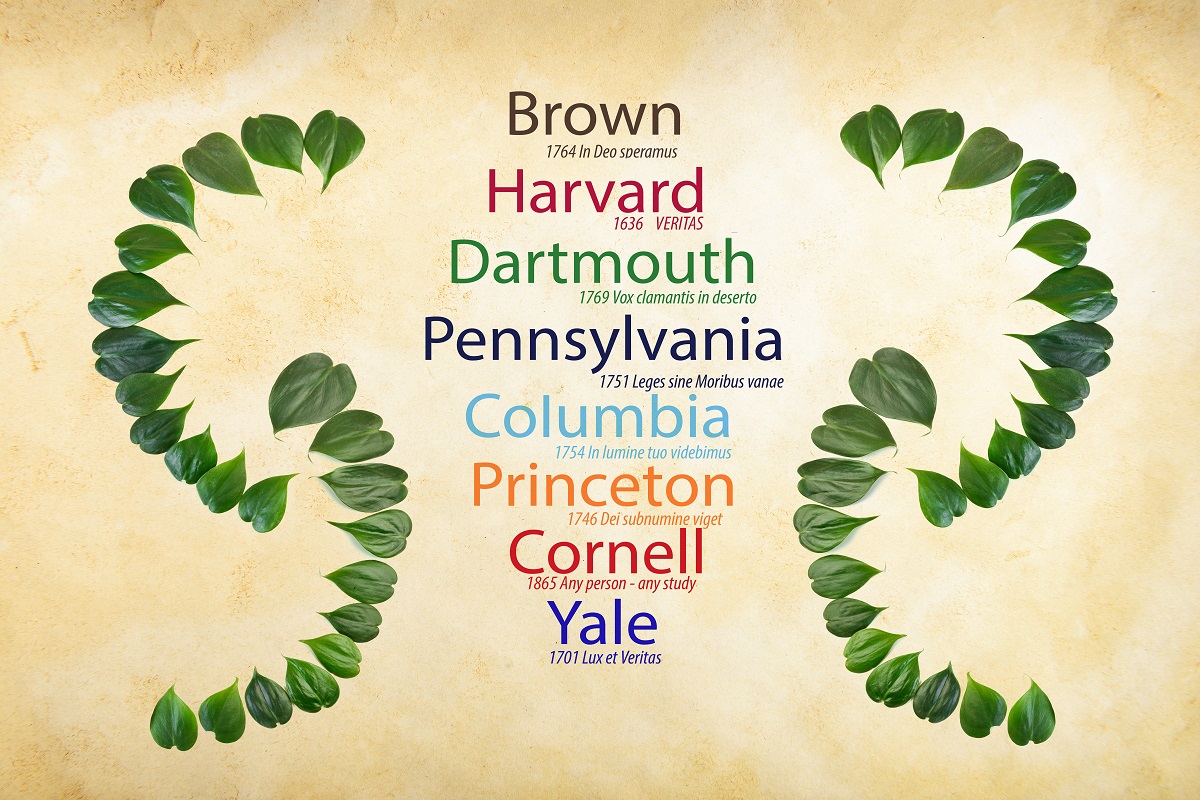3 “Easiest” Ivy League Schools to Get Into: Is Brown the Easiest Ivy?
The Ivy League was officially born in 1954 when Brown, Columbia, Cornell, Dartmouth, Harvard, Penn, and Princeton universities decided to form an athletic conference. The eight schools are some of the most prestigious and selective universities in the United States. They all rank in the top 20 of the country’s best universities.
The Ivy League wasn’t born with big academic goals in mind, it was actually formed to increase the competitiveness of the schools in sports. However, over time the Ivies have become known for their excellent academics as well.
Getting into an Ivy League school is no easy task. The eight schools in the Ivy League are among the most prestigious and selective universities in the country. In order to be accepted, students need to have excellent grades and standardized test scores, as well as a strong application essay.
In this article, we are going to rank the eight Ivies based on how difficult they are to get into. We will look at things like acceptance rates, average GPA, and average SAT scores.
So, without further ado, let’s get started!
Getting into an Ivy League College
While each college has specific requisites to join, all of the Ivy League ones have the most strict requirements to apply because of their prestige. Here’s what you’ll need if you want realistic chances to get accepted into an Ivy League College
GPA
All Ivies look for students with great grades, most have a requirement of a minimum GPA of around 3.5. But realistically, unless your GPA is 4.0, your chances to get in drop considerably.
If your GPA is low, focus on raising it. There are many ways to do this, and most schools have resources to help you out. You can also look into test preparation programs or even tutoring services to raise your grades.
SAT Scores
The average SAT score for all Ivies is around 1400 combined math and reading scores. This means that you’ll need to score in the top 30% of students who take the SAT.
Again, if you’re not meeting these scores, there are ways to improve. You can join a test prep course or get private tutoring. And don’t forget that your essay is also a very important part of your application.
Personal Essay
The application essay is one of the most important parts of your application. This is your chance to show the admissions committee who you are and what makes you unique.
Make sure to write a well-crafted essay that tells your story. Be passionate about what you wrote and make sure to show off your writing skills.
This is your chance to shine.
Editor’s note: Since most students who apply for Ivy League amply satisfy all of the above requirements, you need to set yourself apart from the competition if you want to be accepted into an Ivy League school.
This is usually achieved through extra curricular activities like volunteering and work experience that net you gloating letters of recommendation.
The School’s Acceptance Rate
Naturally, the higher the school’s acceptance rate, the easier it is to get in. To calculate the acceptance rate, we divide the number of applicants by the number of accepted students.
This is something not many people take into consideration. It’s harder to get into a college if 100.000 people apply for 1.000 spots than if 50.000 people applied for 2.000 spots.
In other words, if the Ivy League college only has room for 1000 students, and there are 100000 students who want to get in, then your chances of getting in are slim to none. However, if there are only 20000 students trying to get into that same 1000-student school, then your odds are much better.
So, even if acceptance rates seem low, it’s important to remember that the applications / available spots ratio also factors into how difficult it is to get accepted.
Other Requirements
In addition to your GPA, SAT scores, and application essay, you’ll also need to submit letters of recommendation and transcripts.
Make sure you ask teachers and counselors who know you well to write your letters of recommendation. They should be able to speak to your strengths and how you would be a great addition to the college.
Your transcripts are also very important. Make sure your grades are up to par and that you have a balanced transcript with no glaring weaknesses.
Picking the Right Ivy League School
While all of the Ivy League Schools are prestigious, they’re not all created equal.
Each school has their own strengths and weaknesses, so it’s important to do your research before you apply.
Some schools focus more on STEM (Science, Technology, Engineering, and Mathematics), while others have a strong liberal arts program. Some schools are more expensive than others, and some have better athletic programs.
Another thing to consider is the school’s location. If you have to move to attend it’s best to pick a college in a city that suits your preferred lifestyle. If you’re big into nightlife for example, then you’ll want to choose a school in a city like New York or Boston.
So, if you’re aiming for an Ivy League School, make sure you do your research and pick the one that’s best suited for you. While getting into an Ivy League is no easy feat, it’s not impossible. With hard work and perseverance, you can achieve your dreams.
Also Read:
The 3 Easiest Ivy League Schools to Get Into
So, now that we know what it takes to get into an Ivy League school, let’s take a look at the easiest schools to get into.
The main factor we looked at is acceptance rates, because they are a good indicator of how difficult it is to get in. We also considered GPA and SAT scores, as well as other requirements.
Here are the Ivy League colleges ranked from easiest to hardest.
1) Cornell University
- Acceptance rate (2020): 10.7%
- Number of students who applied in 2023: 51,328
- Average SAT scores: reading and writing 680-750, math 720-790
Cornell was founded in 1865 by Ezra Cornell and Andrew Dickson White. It’s a public research university located in Ithaca, New York.
Cornell is the easiest Ivy League school to get into, with an acceptance rate of 10.7%. 51,328 students applied to join in 2023, which means that a little over 5.000 were accepted.
Cornell is also one of the most appealing colleges for other reasons. One, its camp is extremely diverse. About 60% of students identify as a race or ethnicity other than white, and 37% of freshmen come from low-income families.
Cornell also has a top-notch business school, with programs in accounting, finance, management, and marketing. And with over 4.000 courses to choose from, it has something for everyone.
As with all elite colleges, the requirements are still very high to join. Don’t expect to get in if your GPA and SAT scores are below average (with the average being quite high because of competition). But, if you have a decent GPA and high SAT scores, Cornell is definitely the easiest Ivy League school to get into.
So, if you’re looking for an Ivy League school that is relatively easy to get into, and has a wealth of opportunities, Cornell is the school for you.
2) Dartmouth College
- Acceptance rate (2020): 9.2%
- Number of students who applied in 2023: 22,033 students
- Average SAT scores: reading and writing 710-770, math 730-790
Dartmouth College was founded in 1769 by Eleazar Wheelock. It is a private liberal arts college located in Hanover, New Hampshire.
It has a respectable acceptance rate of 9.2%, which means that of 22,033 students who applied, around 2.000 got accepted. That’s a pretty respectable number, but it should be noted that the SAT averages are quite high.
One of Dartmouth’s biggest advantages is its size. With only around 4000 undergraduate students, it’s a much more personal school than some of the other Ivies.
Despite the small size, the college offers over 2.000 courses on liberal arts subjects like art history, economics, and linguistics. They also have a respectable MD program, which is one of the oldest in the country.
If you’re looking for a smaller Ivy League school and aren’t scared of high SAT averages, Dartmouth is a great choice.
3) University of Pennsylvania
- Acceptance rate (2020): 9%
- Number of students who applied in 2023: 44,482 students
- Average SAT scores: reading and writing 710-770, math 750-800
UPenn was founded in 1740 by Benjamin Franklin. It is a private research university located in Philadelphia, Pennsylvania.
With such an illustrious founder, you’d expect it to rank at the bottom of this list. But luckily, that is not the case. It has a respectable acceptance rate of 9% which is only .2% lower than Dartmouth’s and is a way bigger university. Roughly 4.000 new students will attend UPenn in 2023.
UPenn’s biggest appeal is its location in Philadelphia. The city is home to some of the best hospitals, law schools, and business schools in the country. UPenn also has a great engineering school, with programs in chemical engineering, civil engineering, electrical engineering, and mechanical engineering.
But with such high competition (the math SAT averages are 750-800), you’ll need high grades and SAT scores to get in.
If you’re looking for a top-notch university located in a great city, UPenn is your best choice.
Getting Outstanding Letters of Recommendation
This is easily the best way to make your application unique compared to the other applicants. Not that having a 4.0 GPA isn’t impressive, but in such elite schools it’s sort of expected. For example, the average admission GPA in Cornell in 2023 was 3.8.
So, what is a letter of recommendation? A letter of recommendation is a letter written by someone who knows you well and can vouch for your academic and personal achievements. Usually, this person is a teacher or counselor.
Your letters of recommendation should be from people who can speak to your intellectual ability, leadership skills, and character. They should also be specific about what makes you unique and why you would be a great addition to the school.
If you want to make your application really stand out, get letters of recommendation from people who can speak to your strengths and achievements. This will show the admissions committee that you’re not just another applicant, but that you’re someone they should consider admitting.
But, if you can get a letter of recommendation from a CEO or owner of a company, that will definitely set you apart.
The best way to do this is to start building relationships with these people when you’re still in high school. Volunteer for their company, offer to help them with anything they need, and attend events where they will be speaking.
Once you have a relationship with them, ask if they would be willing to write you a letter of recommendation. If they agree, make sure to send them a resume, transcript, and any other information they may need.
If you want to give yourself the best chance of getting into an Ivy League school, get outstanding letters of recommendation.
Conclusions
While these may be the easiest Ivy League colleges to get into, joining them is still pretty difficult. If you want to have a chance of getting into one of these schools, you need to have high grades and SAT scores.
But, don’t let that discourage you. These schools offer some of the best academic programs in the country and are located in great cities. If you get into them and complete your course, you’ll leave with a strong degree that will grant you a fancy job wherever you please. Studying at elite schools is a great way to start your career.
And don’t just go to an elite college because your friends or parents told you so. It’s important to pick a school that’s the best fit for you and your interests. There are plenty of great colleges out there, so don’t be afraid to explore.
So, if you’re up for the challenge, apply to one of these schools and see what happens.







